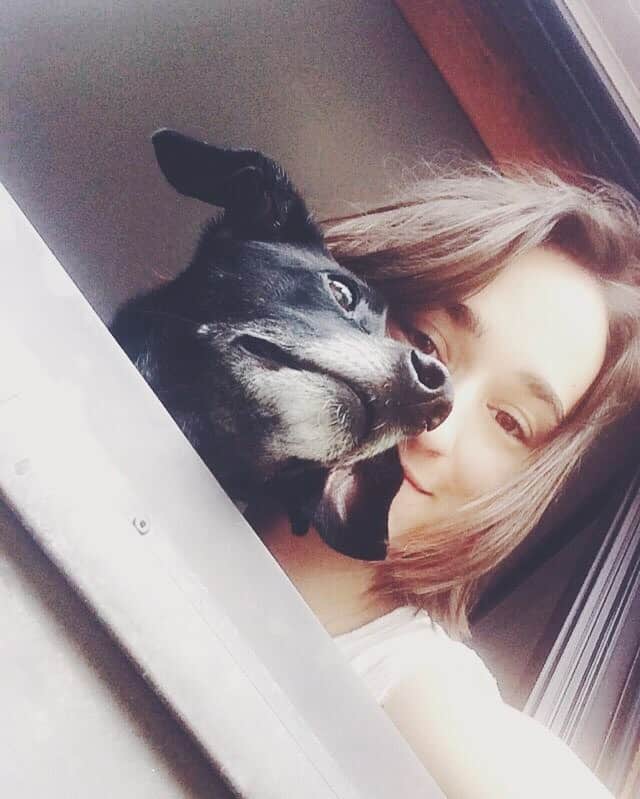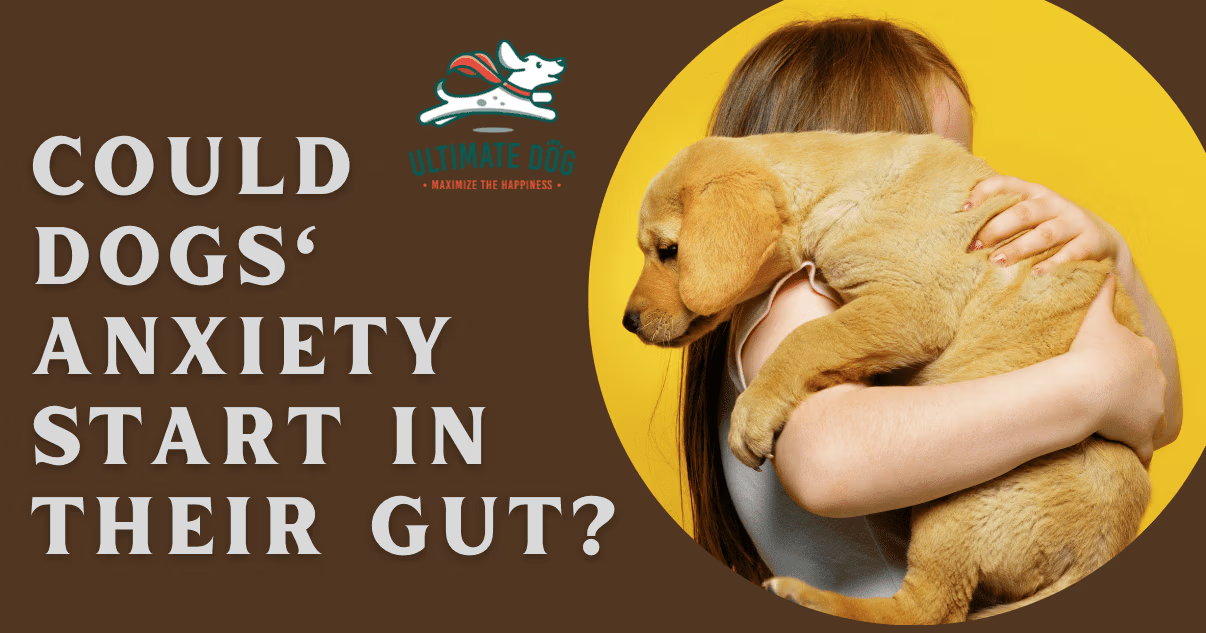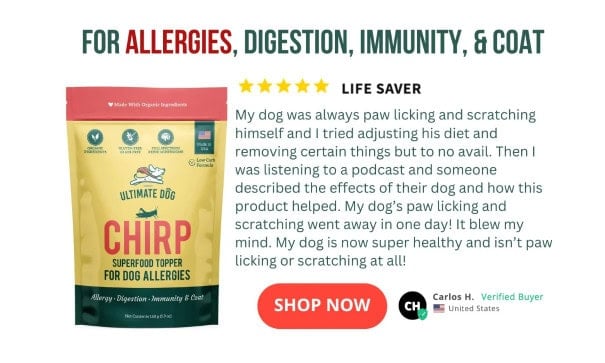Dog anxiety is a problem caused by environmental and biological factors. The classic anxiety treatments focus on environmental factors and dealing with behavioral problems that are a consequence of the dog’s fearfulness. But without taking biological factors into consideration, it’s hard to speak about a long-term behavioral change. The structure of your dog’s gut plays a very important role in his anxiety — knowing this can be your greatest asset in helping your anxious dog.
The Link Between Gut Microbiome, Brain, and Behavior
The gut and the brain have a strong connection, often called the gut-brain axis. It means the brain communicates with the gut and vice versa. A lot of research in the past few years has explored this connection, continuously proving that the central nervous system receives signals from the gut. The gut-brain connection is made possible by the vagus nerve. Any changes that happen in the gut are reported to the brain by the vagus nerve acting as the messenger. This directly affects the dogs’ neurological state and, through that, their behavior.
A lack of diverse and favorable bacteria in the gut compromises the production of important neurotransmitters, such as GABA, serotonin, and dopamine. They are responsible for a calm, stable, and happy state of mind. Gut health is a crucial biological factor in the issue of dog anxiety. If their brain is not producing the necessary chemicals to make them feel safe and calm, their emotional responses (and therefore behaviors) will continue to be the same no matter how many environmental factors we address.
Unusual Gut Microbiome of Anxious Dogs
A study published in 2019 uncovered the connection between gut microbiome structure and aggressive behavior in dogs. 31 pit bulls included in the study were all rescued from a dog fighting ring and behaviorally assessed. 12 of them were classified as dog-aggressive, and 10 were declared non-aggressive. The researchers examined the dogs’ fecal samples, looking for potential differences in the microbiome between the two groups — and that is exactly what they found. The microbiome of aggressive dogs diverges from the microbiome of non-aggressive dogs.
This means that the gut microbiome is an important element of understanding, healing, and possibly preventing aggression. If we could catch the predisposition for aggressive behaviors early on by regularly examining fecal samples and tracking the gut microbiome health, we might be able to implement early interventions.
We could help our dogs when the aggression is still manageable before it becomes too severe. But knowing about the brain-gut connection also gives us the option of reshaping the dog’s gut microbiome to help treat existing aggression! “The gut microbiome acts as an agent of the nervous system,” the researchers concluded.
Another study published a year later also looked at the structural differences in the gut microbiome of dogs with behavioral issues. They added another group of dogs to their research — dogs with phobias. 42 shelter dogs participated in the study, of which 11 were aggressive, 13 were phobic, and 18 were psychologically healthy. In the first mentioned study, all dogs were the same breed, staying at the same shelter, in the same living conditions, eating the same food.
The second study took a step forward and included dogs of different breeds from three different shelters. They lived in different conditions and ate different food. When their fecal samples were examined and compared, the results once again showed clear differences between the gut microbiome of healthy dogs and those with behavioral issues.
Each behavioral issue correlates with a unique gut microbiome, so not only did the anxious dogs differ from the psychologically healthy ones, but the phobic and aggressive dogs also had clear differences in their gut structures. Aggression is one of the most intense manifestations of fear, so it’s not surprising that the most significant gut dysbiosis was observed in the aggressive group.
What Causes Gut Dysbiosis in Dogs?
As a society, when we modernized our approach to food and medicine, we automatically applied the same changes to our dogs. They are our closest animal companions, and we are completely in charge of their diet and medical care. Most human studies can be applied to dogs — we have a shocking amount of similar diseases in shockingly similar numbers. For example, cancer is the leading cause of death for both humans and dogs. The number of anxious dogs and people rises every year as well, with over 50% of dogs and people experiencing anxiety or other psychological struggles. We share a lifestyle. We share diseases. The connection is clear.
Gut dysbiosis plays a role in physical and neurological conditions. An imbalance of microorganisms in the gut compromises health as a whole. Antibiotics are one of the main culprits for severe gut dysbiosis. As their name suggests, antibiotics are anti-biotic, meaning they kill bacteria. This is how they are designed to work, but the problem is they can’t differentiate between the bad and the good bacteria, so they kill all of them, leaving the gut depleted of essential microorganisms. One study showed that antibiotics killed more than 85% of gut bacteria!
Another cause of gut dysbiosis is an inappropriate diet. Most commercially available dog food is not species-appropriate. This once again mirrors our human dietary habits — we choose convenience over nutrition and do the same to our dogs. We feed them highly-processed food, depleted of important nutrients due to being processed at high temperatures. Synthetic nutrients are then artificially added to the mix, often in skewed proportions that don’t align with canine nutritional needs.
Many dog food brands build their kibble around grains and corn because they’re high in calories and cheap to produce. Not only is this an inappropriate choice for dogs (having the GI tract of a carnivore), but it also puts their health at risk due to harmful herbicides that make their way into the food.
There are other factors that contribute to gut dysbiosis, such as medication, vaccines, chlorinated tap water, excessive use of disinfecting cleaning products, deworming pills, and anti-tick chewables. It’s not always possible to avoid all things that negatively impact our dog’s microbiome. This is why we have to consistently support his gut, even more so if we have an anxious dog!
Natural and Gut-Supporting Anxiety Relief for Dogs
1 — Probiotics for low cortisol
Probiotics should be a part of every dog’s diet. They’re the most important supplement for gut health, which makes them valuable to the entire immune system, including proper brain function. Probiotics have an antidepressant and anxiolytic effect, leading many researchers to champion the idea of psychobiotics — medically prescribed probiotics as the first intervention in healing neurological problems.
Animal studies have shown that a consistent probiotic treatment leads to lower cortisol levels, decreased anxiety, and changed problematic behavior. Through balancing the gut microbiota, the probiotics help change the body’s response to external stress caused by your dog’s triggers.
Probiotics are also a must when your dog is put on antibiotics. The goal is to replenish the diversity of healthy gut bacteria that the antibiotics eradicated alongside the unhealthy ones. The microbiome has to be restored as soon as possible! Pro-biotics are the opposite of anti-biotics. They are the healthy bacteria needed in the gut.
2 — Enzymes for homeostasis
Enzymes are present in the cells of all living things. They play a vital role in chemical reactions, making them a key component of homeostasis (the inner stability of the organism). Eating a good diet provides dogs with a steady supply of enzymes on a daily basis. But as I mentioned earlier, most modern dog foods are overly processed and produced at high temperatures, making them depleted of enzymes.
This puts our dogs at high risk for degenerative diseases and cognitive decline, both being the symptoms of premature aging. Anxiety (and behavioral problems that follow) is often the first symptom of disease, as dogs can feel that something is off in their body months or even years before we catch up.
Dr. Edward Howell was a medical doctor who dedicated a big part of his life to practicing holistic medicine and researching enzymes. He called them a life force. He discovered that raw foods are abundant in enzymes and that out of all animal species, humans and domesticated animals are the only ones regularly consuming enzyme-depleted food. That’s why we have so many similar diseases, diseases seldom seen in other species.
Digestive enzymes aid healthy digestion and help carry the gut’s metabolic burden. Supplementing them is a good way to make up for the enzymes lost during food processing. This is one of the best ways to increase your dog’s longevity and ensure his cognitive ability remains strong as he ages. In Dr. Howell’s words, “when the enzyme potential is exhausted beyond a particular point, it triggers the end of the lifespan.”
3 — Omega-3 for reducing aggression
Low levels of omega-3 fatty acids are linked to aggressive tendencies in dogs, research shows. Blood samples of 18 aggressive German Shepherds were compared to 18 non-aggressive dogs, and the results showed clear differences in omega-3 levels between the two groups. Several human studies have confirmed this connection as well. More research is needed to examine exactly how omega-3 supplements could help change problematic behavior, but even what we know so far is a promising start that gives us insight into a key component of our dog’s healthy state of mind. The best source of omega-3 for dogs is fish, so make sure it’s a staple in your dog’s diet!
4 — Reishi for serotonin & quality sleep
A fascinating study on mice found a connection between the gut microbiome, serotonin, and the quality of sleep. First, they depleted the gut microbiota of mice with antibiotics, then gave them ethanol extract of Reishi to see if it affected the microbiota. Reishi helped replenish the microbiota and enhance its diversity! The main focus of this particular study was how Reishi can improve sleep and what role the gut plays in that process.
Researchers found that depleted microbiota leads to interruptions in the sleep cycle, even delaying Reishi’s sleep-promoting qualities. They also found that Reishi promotes sleep through a serotonin pathway! Serotonin helps regulate sleep, so a deficiency manifests as poor sleep quality, among other things. This is a cycle without an end unless we aid our dogs in their rest.
Anxious dogs need a lot more rest than other dogs because they are frequently stressed out during their waking hours. They need deep sleep in order to decompress, but their anxiety often makes them light sleepers, easily jolted awake. Reishi is one of the best supplements for dogs, and it has many other health benefits alongside sleep support. Depending on the health of your dog’s gut, Reishi might help your dog sleep straight away, or it might take some time until the microbiota recovers. You can pair Reishi with soil-based probiotics for maximum efficiency!
5 — Exercise for daily microbiome enrichment
Research shows that exercise increases the number of healthy bacteria in the gut, so we have a daily opportunity to enrich the microbiome of our dogs! Quality exercise means more than just potty breaks. It means physical activity your dog enjoys, structured in a way that satisfies his instincts (sniffing, digging, chasing, etc.). For anxious dogs, most of their exercise should happen in environments that are not stressful or overwhelming, as prolonged stress negatively affects the gut.
Dog Behavior Problems Need A Holistic Approach
Behavior modification is one side of the coin; supporting our dogs on a biological level is the other. Focusing only on one side and forgetting about the other won’t yield long-term results. The number of anxious dogs is higher every year, and with that rises the number of dogs surrendered to shelters and euthanized for behavioral problems.
I’ve been living with a severely anxious dog for a decade now, so I know how frustrating it is when we make progress only to slide back a few months or years later. Treating dog anxiety always requires multiple levels of support. My hope is that this article sheds a very necessary light on a level that you might not have considered yet. I know it did for me.
Sources
Kirchoff, S. Nicole. Udell, A.R. Monique. Sharpton, J. Thomas. “The gut microbiome correlates with conspecific aggression in a small population of rescued dogs (Canis familiaris).” PubMed, 09/01/2019.
Mondo, E. Barone, M. Soverini, M. D’Amico, F. Cocchi, M. Petrulli, C. Mattioli, M. Marliani, G. Candela, M. Accorsi, P.A. “Gut microbiome structure and adrenocortical activity in dogs with aggressive and phobic behavioral disorders.” PubMed, 29/01/2020.
Evrensel, Alper. Ceylan, Mehmet Emin. “The Gut-Brain Axis: The Missing Link in Depression.” PubMed, 31/12/2015.
Calvino, Nicholas. “Executive book summary of ‘Enzyme Nutrition: The Food Enzyme Concept’ by Dr. Edward Howell.” Course Hero.
Re, Simona. Zanoletti, Marco. Emanuele, Enzo. “Aggressive dogs are characterized by low omega-3 polyunsaturated fatty acid status.” Springer Link, 19/09/2007.
Yao, Chunyan. Wang, Zhiyuan. Jiang, Huiyong. Yan, Ren. Huang, Qianfei. Wang, Yin. Xie, Hui. Zou, Ying. Yu, Ying. Lv, Longxian. “Ganoderma lucidum promotes sleep through a gut microbiota-dependent and serotonin-involved pathway in mice.” PubMed, 01/07/2021.
Monda, Vincenzo. Villano, Ines. Messina, Antonietta. Valenzano, Anna. Esposito, Teresa. Moscatelli, Fiorenzo. Viggiano, Andrea. Cibelli, Giuseppe. Chieffi, Sergio. Monda, Marcellino. Messina, Giovanni. “Exercise Modifies the Gut Microbiota with Positive Health Effects.” PubMed, 05/03/2017.

Luna’s passion for learning about canine psychology and behavior began when she adopted a severely reactive puppy from a local shelter. She is now a big advocate for positive reinforcement and compassionate training. As a writer, she strives to spotlight the topics that fly under the radar and be the voice for all who cannot speak for themselves.




Leave a Comment